Fionnuala Halligan blogs on the Competition titles straight from the Palais des Festivals.
For the complete version of the Screen jury grid, please click on Jury Grid on the right-hand side below RELATED FILES.
The votes are in…
The critics and Isabelle Huppert’s jury agreed on just one film this year – fortunately it was the big one, Michael Haneke’s Palme D’Or-winning The White Ribbon. The Austrian auteur’s ravishing black-and-white depiction of Germany’s rotten heart in the race towards the First World War also appealed to the market (SPC took it for the US) meaning Cannes 62 wound up as a trifecta of commercial, critical and awards harmony.
Elsewhere, though, the path was rockier. Thierry Fremaux’s Competition line-up was long on critical hits towards the beginning – Bright Star, A Prophet, Looking For Eric,Broken Embraces, The White Ribbon – but also long on long films (12 ran to over two hours; four went over 150 minutes). Clearly, not all of these were finished products destined for the commercial marketplace as they were shown.
To cut a long story short
Cannes has screened works in progress before (Apocalypse Now) being the most famous example; in that respect, this year’s longest film Enter The Void is similarly an artistic statement still in flux). But encouraging directors to build long films over fragile content ultimately does everybody involved a disservice. The worst offenders were, in descending order, In The Beginning (A L’Origine) (155mins) , Face (139mins), Fish Tank, despite its Jury award (124mins), Inglourious Basterds (154mins),Vincere (128mins) and Thirst (133mins), also recognized by the Jury). Cannes 62 was a clear indication that strong directors need stronger producers and a tougher Cannes as the market retrenches: ultimately, it’s about preserving the arthouse sector which won’t survive such a rash rush of indulgent auteurism.
Two-and-a-half hours can breeze by, however, if the director gets it right, as with White Ribbon (145 mins), or A Prophet (150 mins). There were some notable absences from the Jury awards at Cannes on Sunday night. The failure to give any recognition to Jane Campion’s Bright Star could be viewed as a matter of taste – British costume dramas can be alienating, despite Abby Cornish’s excellent turn (the eventual Best Actress winner, Charlotte Gainsbourg, was definitely braver - to the point of self-sabotage - for Antichrist). It was also a surprise not to see Tahar Ramin awarded for his performance in Jac
ques Audiard’s gripping prison drama A Prophet, although the film did take the Grand Jury prize and is assured of a strong commercial future, awards or no (think of it as this year’s Gomorrah).
Screen’s own Jury delivers
And it was nice indeed to see the much-maligned Brilliante Mendoza pick up a directing nod for Kinatay, proving that his darkly-shot tale of a dismembered torso didn’t put everybody off – despite the director scoring the lowest on Screen International’s Cannes Jury grid for the second year in a row (an average score of 1.2). He had company at the bottom, however: the last two films at Cannes this year sent critics howling for the exit doors: Tsai Ming-liang’s inexplicable Face, and Isabel Coixet’s ill-advised Map Of The Sounds of Tokyo (both scored low averages of 1.3). Reaching out to them were Gaspar Noe’s Enter The Void (sure to be re-judged), Lars Von Trier’s Antichrist (sure to be re-cut), and Lou Ye’s Spring Fever (a surprising winner of Best Screenplay), all with 1.6.
Coming soon to a cinema near you
Commercially, Cannes Competition 2009 will have its hits: Ken Loach’s affecting crowdpleaser Looking For Eric is sure to make an international impact (it was bought at Cannes by IFC for the US); A Prophet, will perform strongly in the arthouse sector wherever it goes; despite its pretensions, Antichrist is a ratings-busting genre effort and will perform strongly, particularly in ancillary, within that sector; Broken Embraces will delight Almodovar fans, of which there are many; the hard-core Enter The Void will eventually be re-edited, reassessed and embraced by a younger crowd, covering Gaspar Noe with glory; and The White Ribbon could do everything The Class did last year.
If at first you don’t succeed
And those that fell by the wayside can regroup. One year’s directorial turkey (say, 2008’s Serbis), can be the following year’s Best Director (Brilliante Mendoza, back in 2009 with Kinatay). As Michael Haneke can attest, fortune favours the Croisette returnee.
Day 11
Given the highs of the previous 11 days, Cannes wrapped on something of a low with two poorly-received Competition titles rounding out the selection. Isabel Coixet’s Map Of The Sounds Of Tokyo was booed by a baffled press corps, besieged with yet more extensive sex sequences without the benefit of any real characters or relationship to sustain them.
It was always going to be hard to keep up the momentum of Enter The Void, The White Ribbon, A Prophet, Bright Star, et al, but Coixet’s pop video drama was a glossy misfire. Rinko Kikuchi is a silent and “enigmatic” fishmarket worker in Tokyo who turns out to be a hit-woman sent to whack a Spanish wine-shop owner played by Sergi Lopez. She seemed an unlikely assassin from beginning to end. Shot in English and Japanese with a Catalan coda, this Map went nowhere beyond some energetic sex scenes. But Cannes 62 wasn’t exactly short of confrontational sex and Coixet brought little else to the table. Her Screen International Jury scores ranged from X to 2.
Tsai Ming-liang’s Face, meanwhile, is a series of sustained images loosely revolving around a Taiwanese film-maker preparing a film in Paris (writes Mike Goodridge) and a disappointing final entry in Competition, running to a marathon, static 138 minutes.
This is a sort of Tsai-ized version of Day For Night in which he pays homage to Truffaut – by giving a sizeable role to Jean-Pierre Leaud and calling his character Antoine (after Leaud’s character in five Truffaut films, Antoine Doinel).
Another Truffaut star and his life partner Fanny Ardant actually flicks through books about Truffaut in the film, while Ardant, Natalie Baye and Jeanne Moreau share a surreal dinner. Meanwhile Laetitia Casta dances the dance of the seven veils and Matthieu Almaric and Lee
Kang-Cheng give each other blowjobs on set. There is humour (largely involving a deer called Zazie) and a couple of musical numbers, but the raison d’etre is hard to decipher. It was a blowout on Screen International’s Jury as well, with scores ranging from X to 2 again.
Day 10
Gaspar Noe’s Enter The Void is a pulsating, all-involving, almost mind-bending finale to the 62nd Cannes Film Festival. Although it’s not the last film, it is hard to imagine that anything else is going to land with the 163-minute shock that this does. Trippy and mind-boggling, like a bad drug ride through a long, dark night to hell and back, it won’t be to everybody’s taste. But it can’t be passed over or ever forgotten for those willing to go there with this most audacious of directors.
Noe adopts a first person point of view (the camera actually blinks) as its lead character goes through the ultimate bad trip through the seedy side of Tokyo. Enter The Void will be hailed by some as the future of cinema. It should be a hit with the edgier young crowd. What screened in Cannes this morning seemed like a work in progress. But it’s horrific and memorable, mind-numbingly repetitive and visceral to the point of entering the viewer’s head.
Of note is the fact that it does feature, in graphic, stomach-churning detail, an abortion, surely the last taboo to fall before the enfants terrible of Cannes this year. The Jury is bitterly divided – from Xs to 3s, but no 4. It’s hard to give a four to a film which evidently isn’t finished, while those that hated it, really despised it.
One of the last films to play out in Competition, Elia Suleiman’s The Time That Remains, is a picaresque yet affecting drama set in the largely-Arab Nazareth between 1948 and the present day. Suleiman himself stars, mutely, as himself, and the story is about, and dedicated to, his parents. It is presented in three different parts and takes a while to settle in. The first and second, without Suleiman, are a little more dramatic as Israel is established and the Arab community learns to live with that fact; the last, with Suleiman, takes a turn towards more outright Chaplin-esque routines, which can feel overly repetitive and studied by the end. This certainly isn’t spontaneous - most of the tableux are rigidly composed - but it is charming. It’s a true arthouse film, with the emphasis on art. Screen’s Jury gave it 2s and 3s across the board.
Day 9
Michael Haneke stamped his authority all over the Palais last night with The White Ribbon,a pre-World War I story shot in exquisite black and white which was very reminiscent of Hidden although the millieu couldn’t be much different. Picked up for the US on the eve of Cannes by Sony Classics (which also distributed Hidden there), it has the same iron strength of vision and commanding grip of story, while being deeply disturbing and provocative at the same time. Those who didn’t respond to Hidden’s elliptical ending may have problems with how The White Ribbon wraps but this dark, dark indictment of the Protestent German psyche in a small rural village as Europe hurtles towards the first world war should be a must-see for arthouse audiences everywhere. In a Cannes where film-makers have lurched, often hysterically, over the top, this was a cool show of strength from the Austrian auteur.
The White Ribbon wowed Screen International’s Jury, making a late minute surge at 33 out of a possible 40 points. Now it only ranks behind Jacques Audiard’s A Prophet at 34 and equal with Bright Star at 33, with Pedro Almodovar’s Broken Embraces nipping at their heels.
It’s hard to see why Xavier Giannoli’s In The Beginning (A L’Origine) needs to run to 155-ponderous minutes. A grimmer French version of Catch Me If You Can, bleaked-up and set in the Pas du Nord area of the country (the setting for Welcome To The Sticks), it stars Francois Cluzet as an ex-con who pulls an elaborate scam on a town. His initial intention of coming in for a sharp sting is prolonged initially when he sees a chance to score more cash, but gradually an affection for the desperate townspeople takes over (especially the local mayor, played Emmanuelle Devos). He also rediscovers himself.
Giannoli finds some poetry in the vast construction site he establishes to build a road that’s going nowhere except to help feed a town beknighted by unemployment. Local response in a France struggling with the realities of the recession - mention is made of multi-nationals pulling out for India, etc - could be strong. But elsewhere? In The Beginning sometimes feels as out of touch with commercial reality as its protagonist. Screen International’s jury has been lukewarm: with two scores left to come in, In The Beginning is stalling at 13 points.
Day 8
Quentin Tarantino re-imagines the WWII epic in Inglourious Basterds, a lengthy homage (154mins) to the genre which is utterly Tarantino-esque but pretty hollow at heart. Brad Pitt headlines but his scenes are scant in this mostly French and German-language production, full of references and winks and the type of dialogue you can easily see Tarantino mouthing but which sticks somewhat when given to a Nazi and translated into German. It’s an audacious, and, when it comes to timing, indulgent work - some sequences (the prologue, a lengthy interlude in a cellar) run to more than 20 minutes; this comes after what must have been drastic cutting, as Maggie Cheung does not appear at all in the finished product shown in Cannes today, Mike Myers only has one scene and even Michael Fassbender comes and goes with alarming alacrity.
There are several set-pieces in which Tarantino dazzles with his command, but overall, it is again a command of other people’s cinema (much of Inglourious Basterds is set in the Nazi-era film world, in fact a cinema, in occupied Paris) rather than his own, 14 years after Pulp Fiction dazzled here. Prospects may be affected in the US due to the overwhelming foreign-language dialogue and running time. Germany will be interesting. Screen International’s jury weren’t exactly bowled over, although German member Jan Schulz-Ojala of Der Tagesspiegel gave it a healthy three. Basterds took 24 points out of a possible 40, a full ten points behind leader A Prophet.
Maestro Alain Resnais returns to Cannes Competition after a long break (19 years since My American Uncle) with Wild Grass (Les Herbes Folles), an adaptation of the novel L’Incident starring his regulars Andre Dussolier and Sabine Azema. A month before his 87th birthday, Resnais will walk the red carpet again tonight forty years after Hiroshima Mon Amour became his first film to compete for the Palme D’Or - yet he has never won the Cannes top prize. Resnais is in brightly sparkling - literally - visual form with this tale of how a lost wallet upsets the lives of its middle-aged loser and finder. Whimsical, pertinent, light and dark, left-of-field and entertaining, this slighter work from a great auteur will certainly find audiences at home in France, and his followers internationally will also be quietly enthralled. Mathieu Amalric is fun as a local policeman, while Emmanuelle Devos shows some edge in a brief performance. Some members of Screen International’s jury were rapturous - a generous Michel Ciment of Positif giving it four out of four - but Resnais came in with 25 out of a potential 40.
Day 7
The critics are in rapture again. Returning to the noir territory of Bad Education, Almodovar casts his adored muse Penelope Cruz in Broken Embraces, a 1980s-set melodrama. Sheer, luxuriant noir all the way - apart from a brief Women on the Verge-style film-within-a-film - Broken Embraces is a ravishing film from the Spanish maestro, a glowing tribute to the genre, and one to delight his fans and film buffs everywhere, although the wider audiences of Volver are less secure. Cruz is exquisite. And Almodovar is nipping at the heels of Audiard and Campion in Screen International’s Critic’s Jury who are again tossing around perfect four stars as if they were confetti: as it stands, Pedro is at 32, Campion 33 and Audiard 34 out of a possible 40. Rarely, if ever, has Screen’s jury awarded this many this highly.
Marco Bellocchio’s thundering Vincere also has its fans, scoring a high 31 out of 40. Chronicling in a darkly overwrought manner the travails of Mussolini’s mistress/wife Ida Dasler (Giovanna Mezzogiorno), Bellocchio makes heavy weather of the forgotten woman of Italian history. Dasler had what seems to have been a very brief, sexual affair with the Italian director which produced a child (they’re only ever shown as having one, one-sided conversation). They may or may not have been married. As Bellocchio depicts Ida as being disturbed from the outset, and evidently history has recorded Mussolini’s true nature, it’s clear from the get-go that this sorry tale won’t end well. Bellochio attacks the story with every cinematic trick in the book, but at 128 minutes the story is flimsy to support the operatic force the director unleashes onscreen. It has its merits, undeniably (chief of which are strong performances from Mezzogiorno and Filippo Timi as Mussolini).
Day 6
Ken Loach’s Looking For Eric was received with rapturous applause at this morning’s press screening: a slow hand-clap and a delighted audience of hard-boiled critics who had mocked Lars von Trier’s Antichrist so vocally the night before. Showing Loach at his most populist in many a year (perhaps going back to 1998’s My Name Is Joe, but this has a wider appeal), its feelgood ending after a pretty rocky dramatic ride was warmly welcomed after six days of sex and violence. Of course, having Eric Cantona in an extended cameo helps in France. Expect tonight’s gala screening to be ecstatic when you combine the footballer’s appeal with that of Loach in France. Screen’s Jury gave it 29 out of a possible 40 points: who says critics don’t like a happy ending?
Antichrist is Lars Von Trier at his most provocative. There doesn’t seem to be a genuinely-felt sentiment in it, apart from the conviction that women are the root of all evil - not something he hints at subtly, but clubs the viewer around the head with. Cannes gives Von Trier the oxygen of publicity and Antichrist will draw thousands of irate rants, and, later, a rehabilitation when some declare they love it after all.
Preposterous, but probably destined to become a cult horror ticket - it is well made and, at times, genuinely horrific - Antichrist stars a oft-naked, sexually rapacious Charlotte Gainsbourg and Willem Dafoe as a couple whose toddler child falls to his death from an open window in the prologue. They’re having sex as the accident happens, and Von Trier cuts from the child’s face mid-fall to Gainsbourg’s mid-orgasm, which pretty much sets the tone for the picture. Dafoe, a controlling psychologist, decides to treat Gainsboug’s “a-typical grief” himself.
This leads the couple to a forest retreat called Eden, an evil place where Gainsbourg starts to really lose the plot. Much will be made of a female circumcision sequence and there is beaucoup de female masturbation. Gainsbourg seems to mislay her pants at a certain point and spends the rest of the movie rampaging around the forest naked from the waist down while Dafoe is mutilated a la Misery- and that’s after she charges his erect penis with something akin to a battering ram. Other highlights include a talking fox. Screen International’s Jury scores are in and they’re a pretty indifferent 16 out of a possible 40.
Day 5
Brilliante Mendoza has his fans - and his detractors, and both are out in force for the polarising Kinatay, a visceral, brutal indictment of his native Philippines, its endemic corruption, the cheapness of life there, and ambivalent attitude the country displays towards women. It’s not so much that Kinatay is violent, which it is - it’s how that violence is directed and carried out that draws gasps. Last year’s Serbis was the worst-performing film on Screen International’s Jury chart, but Regent Releasing’s US acquisition and an enthusiastic reception by critics there went a long way towards rehabilitating that equally-polarising film. This year’s Kinatay is the worst-performing film on Screen’s Jury chart this year to date, with four Xs (or ‘bad’) and a score of 12 out of a potential 40. LA Weeky’s Scott Foundas and Jan Schulz-Ojala from Tagesspiegel each give it a reviving three, however.
It’s not easy to watch, but it does seem harsh to call Kinatay bad: technically and thematically it’s a big step forward for Mendoza; it’s redolent of the colour and flavour of Manila, by day and night, two very separate sections which aren’t entirely convincingly stitched together. It’s a provocative and engaging film which traverses the Philippines’ heart of darkness and rings sadly if repellingly true.
It seems rude to say it in France, but the much-anticipated starring turn from national icon Johnny Hallyday in Johnnie To’s Hong Kong and Macau-set Vengeance is something of a letdown. Or perhaps it’s that the elegant triads in his stylish-as-ever revenge thriller, led by the wonderful Anthony Wong and Simon Yam, are so compelling he literally pales in comparison. Vengeance will probably be seen as a lesser work in the To canon, but it’s still highly enjoyable to watch. The plot is as shot through with holes as any of the victims so modishly mown-down on the streets of Asia’s casino capital, and the picture seems to stiffen whenever Hallyday enters the frame, playing the revenge-bent assassin-turned-chef father of a French woman whose family have been murdered. Sadly, the nature of the beast is that there’s a high wastage factor with To’s terse triad killers; in Vengeance, you certainly mourn them as they go.
Day 4
Jacques Audiard has just proved that a running time of 150mins can fly by with the intensely-gripping A Prophet, surely an early frontrunner for the Palme D’Or and featuring a blistering central performance from Tahar Rahim, again, a strong early-runner for best actor. It’s early days, however, and many films to go, but there’s no doubting that Audiard has turned in a very special film. Set in a French prison, where the the illiterate young Malik El Djebena (Rahim) arrives to spend six years in jail, A Prophet follows the friend- and family-less illiterate, a vulnerable new arrival to a prison packed with hardened cons. He is cornered by the Corsicans, but proves tougher and smarter than he originally seems in Audiard’s long-awaited follow-up to 2005’s The Beat That My Heart Skipped, so cruelly overlooked for the Golden Bear at Berlin that year.
The Screen jury has delivered its score and it is an early leader with 34 out of a possible 40 - a number that will be hard to beat.
Day 3
Jane Campion’s rich romance Bright Star has hit the ground running – Screen International’s jury has given her a 33 out of a possible 40 points - a high tally. Her retelling of the doomed romance between Keats (Ben Whisaw) and his neighbour Fanny Brawne (Abbie Cornish) is a cry to the senses that reflects the poetry it inspired; in tone and flavour, it’s highly-reminiscent of The Piano, which saw Campion share the Palme D’Or with Chen Kaige’s Farewell My Concubine back in 1993.
The type of sweeping, well-acted (particularly by Cornish) love story which the Academy adores, Bright Star sold well in advance of the festival including to Bill Pohald and Bob Berney’s new, un-named venture for the US, and its meld of art with commercial potential is a shot in the arm for the festival as the weekend commences.
Taking Woodstock, Ang Lee’s rather more upbeat tribute to America’s age of innocence, is a sparkling comedy with a particularly memorable performance from Imelda Staunton as a Russian Jewish émigré running a Catskills motel called the El Monaco as the hippies arrive – although she is upstaged by Liev Schreiber playing a cross-dressing security guard with long blonde hair called Vilma.
Playing like a series of amusing sun-drenched vignettes, it remarkably recreates the spirit of the age and the event itself, all through the eyes of a young gay man (Demetri Martin) going through the most transformative of all transformative experiences. Although it hasn’t got the heft that a Cannes jury typically opts for, Taking Woodstock should play well globally, and bring in some of the older baby boomer audiences which can certainly add heft to the bottom line.
Day 2
Fish Tank, which didn’t exercise the critics too much in either direction, is Andrea Arnold’s follow-up to the jury Prize-winner Red Road and of course her Oscar-winning short Wasp. Set on a London council estate, it stars newcomer Katie Jarvis in a note-worthy performance (standing out, of course, is now only how Arnold is following Loach’s social-realism road but that she also finds the same level of committed performances from new actors). But it’s going to be hard for Fish Tank to find a wide audience, even at home in the UK. It’s offputtingly long at 124mins and seems, at least at the outset, to travel too familiar a road. Screen’s jury was split between giving it a two and a three, with one juror opting for one.
After this, Thirst, the Korean vampire drama, came as light/dark relief – although, again, it might have felt lighter had it managed to come in at less than a draining 133 minutes. Park Chan-wook is back in stirring, operatic form with this tale of a troubled Korean priest who inadvertently becomes a vampire on a trip to the missions and starts to succumb to, literally, his own inner demons. While Song Kang-ho is suitably tortured as said priest, it’s Kim Ok-vin as the initially dowdy parishioner Tae-joo who lusts after Father Sang-hyun who is a delight. A sex and sucking fest, Thirst was a mid-level hit with Screen International’s critics jury, scoring a high of two and a low of three across the chart.
Day 1
A low-key, down-beat start to Competition proceedings with Lou Ye’s solemn Spring Fever, a story which felt old-fashioned (and over-long) – three men in a Nanjing ménage and two women caught in the middle leading to much angst, a slashing, and even a death. Despite running to 115mins, there was no room for either woman to have a character, so they both smashed the crockery and one disappeared in a service station mid-way through proceedings. Some might envy her.





![Benjamin Kramer Headshot Photo Credit_CAA[40][40]](https://d1nslcd7m2225b.cloudfront.net/Pictures/274x183/6/6/4/1455664_benjaminkramerheadshotphotocredit_caa4040_107707.jpeg)
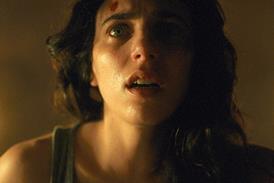
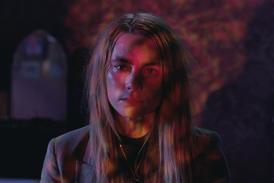





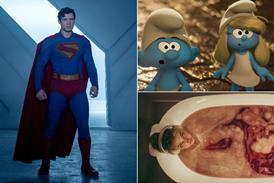
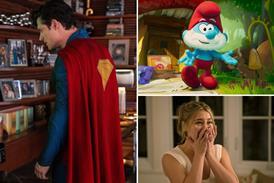
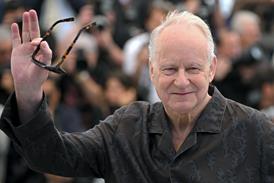






No comments yet